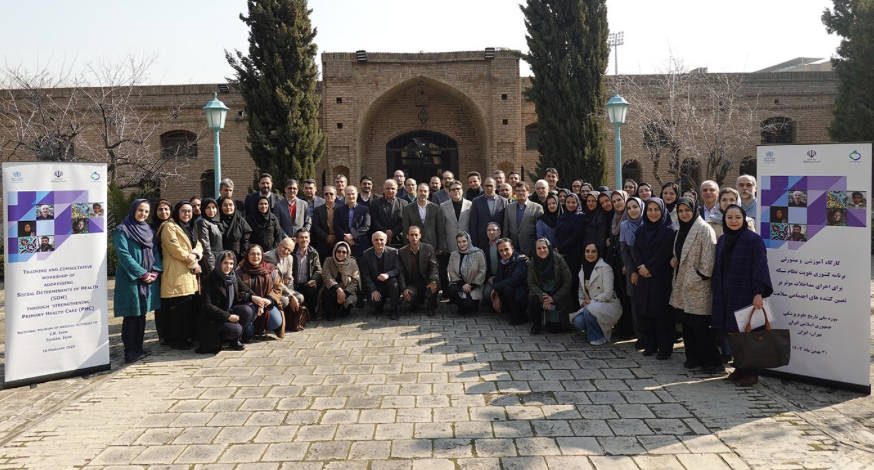MoH&ME in Iran, in collaboration with WHO, organized a workshop focused on integrating social determinants of health into primary health care to address health inequities in the country. The event brought together stakeholders to develop actionable strategies and strengthen intersectoral collaboration.
On 18 February, the Ministry of Health and Medical Education (MoHME) of Iran and the World Health Organization (WHO) convened a workshop at the National Museum of the History of Medical Sciences in Tehran, aimed at integrating social determinants of health (SDH) into primary health care (PHC) to address health inequities. This event attracted various stakeholders, including health deputies from medical universities and representatives from pilot districts.
The full-day workshop focused on refining approaches and fostering collaboration among participants. The interactive sessions comprised eight group work activities organized into four teams, encompassing the entire spectrum of SDH. Participants worked on establishing effective SDH committees, evaluating health equity indicators, and progressing through planning, monitoring, evaluation, and documentation stages.
The initiative recognizes that SDH—covering structural, political, cultural, economic, and environmental factors—profoundly impact health outcomes. By addressing these determinants, Iran aims to enhance intersectoral collaboration and prioritize health across all sectors, which is crucial for achieving sustainable health equity improvements. Iran has made notable strides in integrating SDH into its health system, evidenced by the development of a national protocol and a provincial network centered on medical sciences universities and research centers. A coaching and mentorship approach has been pivotal in creating a comprehensive operational SDH framework.
Key achievements include the identification of health inequity indicators through a systematic approach that utilizes real data and promotes active stakeholder and community engagement. These indicators form the foundation for tailored action plans in pilot areas, ensuring targeted and effective interventions. During the workshop, leaders reaffirmed their commitment to health equity.
Dr. Alireza Raeisi, the Deputy of Health at MoHME, highlighted the importance of community engagement, emphasizing the critical roles of health volunteers, PHC networks, and international partners in supporting SDH initiatives. “Our success hinges on our ability to mobilize and empower communities,” he remarked. Dr. Syed Jaffar Hussain, WHO Representative and Head of Mission to Iran, commended Iran for its proactive approach to addressing SDH through PHC, positioning the country as a regional leader since 2022. He assured WHO’s continued support in these endeavors, asserting, “Iran’s proactive approach sets a strong example for other nations.” Dr. Seyed Hasan Emami-Razavi, Head of the Supreme Council of Health and Food Safety, reiterated the Council’s commitment to strengthening governance structures for addressing SDH. Dr. Mohammad Assaei provided insights into Iran’s progress, including the first national protocol and outcome-based health indicators, while Dr. Koorosh Etemad emphasized the importance of a comprehensive, people-centered approach to health equity.
Overall, the workshop marked a significant advancement in translating SDH principles into actionable strategies, highlighting that health is influenced not only by medical care but also by the social, economic, and environmental contexts in which individuals live and work.


